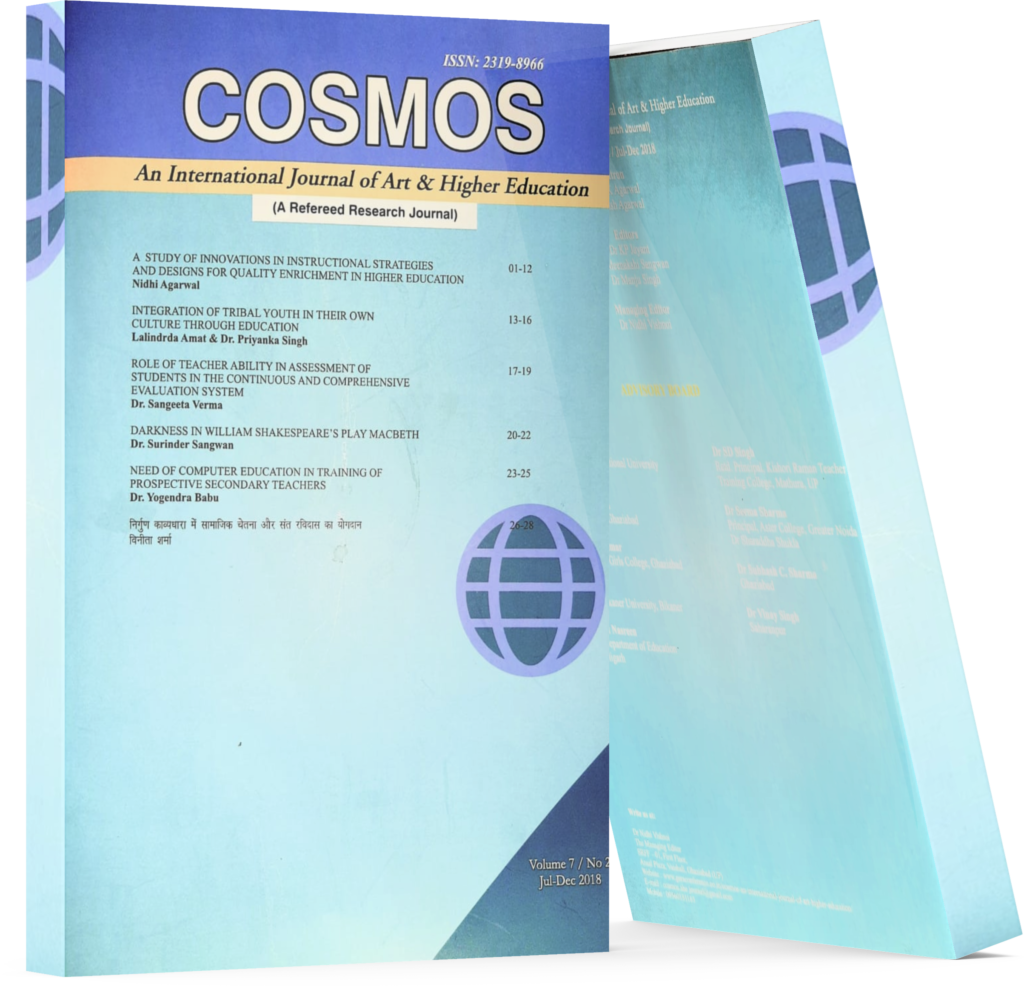Social Network Exposure And Students’ Vocabulary Proficiency Of Second Language: Basis For Reading Enrichment Method
Keywords:
Reading Enrichment, Second Language, Social Network Exposure, Students’ Vocabulary Proficiency.Abstract
The main concern of this study was to determine the relationship between the learners’ exposure to social media networks and their vocabulary/lexical development. It assessed the students’ digital resources, the considerable amount of time they spend on media networks, the duration of time they spend on these technologies, and the influences of this exposure on their vocabulary development. The study utilized the universal sampling with a total population of one hundred three (103) Grade 7 students in a private Catholic university in the City of Malolos, Bulacan during the school year 2020-2021. The results were analyzed and interpreted using statistical tests such as regression analysis in assessing the significant relationship between the learners’ exposure to social media networks on their vocabulary/lexical development.
Downloads
References
Alcedo, Apolonia M., Cajala, Victor M. (2015, March 4). “The Present Computerization Program of The Bureau of Customs: Focus on Import and Export Transactions”, DLSU Research Congress 2015. De La Salle University, Manila.
B. Thesis and Dissertation
Foreign
Igbokwe, J.C. and Obidike, N.A., (2012). “Influence of Electronic Media on Reading Ability of School Children”, Nnamdi Azikiwe Library. University of Nigeria, Nsukka, Nigeria. Retrieved January 9, 2016 from http://www.webpages.uidaho.edu/~mbolin /igbokwe-obodike-ezeji.thm.
Subrahmanyam, Kaveri., Carillo, R. and Tran, Phuoc, (2013). “Effects of online multitasking on reading comprehension of expository text”, Cyber psychology: Journal of Psychosocial Research on Cyberspace. 7(3), article 1. Web.
http://www.cyberpsychology.eu/view.php ?cisloclanku=2013120901.
Naizabekov, Sanzhar. “Negative impact of social networking sites on academic performance of students”, Nazarbayev University, Centre for Preparatory Studies.
Local
De Guzman, Christopher Alvin M., (2014). “The Relationship between the Profile and the Reading Comprehension Levels of Junior Education Students at the University of Makati”, Polytechnic University of the Philippines. College of Education. Master of Arts in English Language Teaching.
Lagro, Lanie I., (2011). “Factors Affecting the Reading Comprehension of the Grade Six Pupils of Selected Elementary Schools in District of Tansa, Cavite”, Master Thesis. Course Specialists of the School of Distance Education. Open University System.
Manuel, Charity T., (2013). “The Reading Comprehension based on McCall- Crabbs Test and the Reading Study habits of the third- year high school students in selected Public High Schools in District VI, Manila”, Polytechnic University of the Philippines. Master Thesis. Course Specialists of the Open University.
Matutina, Jocelyn M., (2012). “Reading Comprehension Ability of Grade III Pupils at West Fairview Elementary School: An Assessment”, Master in Education Management. Polytechnic University of the Philippines. Open University System.
C. Electronic Reference
Armstrong, Steve, (2012). “Negative Effects if Social Networking Sites for Students”,
http://www.business2community.com/soci al-media/negative-effects-of-social-
networking-sites-for-students
#XIu0r15D7rwDeivb.97
Casper, Mike., Catton, Julie. and Westfall, Sally, (1998). “Comprehension: Theories and Strategies”. School of Education and Counseling Psychology, Retrieved December 28, 2015 from
http://www.dominican.edu/academics/edu cation/about/madaliennepeters/compprehe nsion.
Falcis, Mikee O. and Pidlaoan, Princess, (2013). “Top 8 Most Visited Social Media Sites by Teens”, Retrieved January 4, 2015 from http://www.mb.com.ph/top-8- most-visited-social-media-sites-by
teens/#m1q22rvHKk0J1yZH.99.
Fluid Surveys Team, (2014). “Descriptive Research: Defining Your Respondents and Drawing Conclusions”. Fluid Surveys University. Web. Retrieved January 29, 2016from
http://fluidsurveys.com/university/descript ive-research-defining-respondents
drawing-conclusions/.
Krakowsky, Aurelie, (2014). “Student Examines Negative Effects of Social Media on Teens”,
http://www.starnewsonline.com/article/20 140415/ARTICLES/140419801?p=2&tc= pg.
Marshall, P.M., (2012). “Reading comprehension”, Reading Instruction K12 Reader Resources for Teachers and Parents. Retrieved January 8, 2016 fromhttp://www.K12reader.com.
Wikipedia, (2016). “Social Media Definition”, Wikipedia.org. Retrieved January 8, 2016 from
http://en.wikipedia.org/wiki/Social_media. 8. Moyer, Jessica E., (2016). “Teens Today Don’t Read Books Anymore”: A Study of Differences in Interest and Comprehension Based on Reading Modalities”, The Journal of Research on Libraries And Young Adults. Web. Retrieved January 28, 2016 from
http://www.yalsa.ala.org/jrlya/2010/11/tee ns-today-dont-read-books-anymore-a study-of-differences-in-interest-and comprehension-based-on-reading
modalities-part-1-introduction-and
methodology/.
Obidike, N.A. and Igbokwe, J.C., (2012) “Influence of Electronic Media on Reading Ability of School Children”, http://www.webpages.uidaho.edu/~mbolin /igbokwe-obodike-ezeji.htm.
Revesencio, Jonha, (2015). “Philippines: A Digital Lifestyle Capital in the
Making”, The World Post. Web. Retrieved December 28, 2015 from
http://www.huffingtonpost.com/jonha revesencio/philippines-a-digital
lif_1_b_7199924.html.
Romeo, Nick, (2014). “Is Google Making Students Stupid”, the Atlantic Daily Newsletter. Web. Retrieved January 28, 2016 from
http://www.theatlantic.com.education/arch ive/2014/09/is-google-making-students stupid/380944/
Rosen, Larry D., (2011). “Social networking's good and bad impacts on kids”,
http://www.sciencenewsline.com/news/20 11080808030002.html.
Chamie, Joseph, (2014). “Women More Educated Than Men But Still Paid Less”, Yale Global. Web. Retrieved April 1, 2016 from
http://yaleglobal.yale.edu/content/women more-educated-men-still-paid-less-men. 14. Lopez, Mark Hugo and Barrera, Ana Gonzales, (2014). “Women’s College Enrollment Gains Leave Men Behind”, Factank. Web. Retrieved April 1, 2016 from http://www.pewresearch.org/fact tank/2014/03/06/womens-college
enrollment-gains-leave-men-behind/. 15. Davidson, Lauren, (2015). “Is Your Daily Social Media Usage Higher Than Average?”, The Telegraph. Web. Retrieved April 1, 2016 from
http://www.telegraph.co.uk/finance/newsb ysector/mediatechnologyandtelecoms/116 10959/Is-your-daily-social-media-usage higher-than-average.html.
Bennett, Shea, (2015). “28% of Time Spent Online Is Social Networking”, Social Times Web. Retrieved April 4, 2016 from
http://www.adweek.com/socialtimes/time spent-online/613474.
Pearl, Han, (2014). “Children, Teens, and Reading”, A Common Sense Media Research Brief. Web. Retrieved April 4, 2014 from
file:///C:/Users/HanPearl/Downloads/csm childrenteensandreading-20140.pdf. 18. Bridgestock, Laura, (2013). “What Drives Students’ Social Media Usage?”, Top Universities. Web. Retrieved April 4, 2014 from
http://www.topuniversities.com/blog/what -drives-students-social-media-usage.

